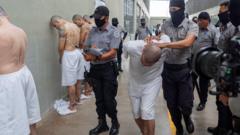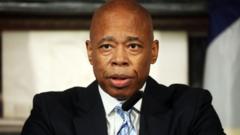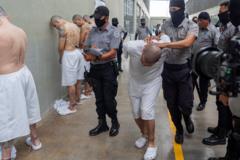The US has deported 17 alleged gang members to El Salvador, amid legal challenges to these actions. Secretary of State Marco Rubio highlighted the serious nature of the deportees' alleged crimes, while the Salvadoran government affirmed their commitment to tackling organized crime.
US Continues Controversial Deportations of Alleged Gang Members to El Salvador

US Continues Controversial Deportations of Alleged Gang Members to El Salvador
Amid ongoing legal disputes, the Trump administration has deported more alleged gang members to El Salvador, with implications for immigration law.
The Trump administration has recently deported an additional 17 alleged gang affiliates to El Salvador, as reported by the US State Department. This move has sparked significant legal controversies, especially considering ongoing challenges to the deportation practices linked to the Alien Enemies Act, a law originally established in 1798. U.S. Secretary of State Marco Rubio confirmed that those deported include members affiliated with notorious groups such as the Tren de Aragua and MS-13.
Salvadoran officials disclosed to the BBC that the deportees comprise both Venezuelan and Salvadoran nationals. Although a court ruling earlier this month temporarily halted deportations under the cited Alien Enemies Act, sources from the administration claimed that the recent actions were carried out under standard immigration regulations. Rubio described the group as "murderers and rapists," but refrained from sharing specific identities or details regarding their alleged offenses or past convictions.
Sharing a graphic video on social media, El Salvador's President Nayib Bukele showcased the arrival of the shackled individuals, emphasizing that they are confirmed offenders, including six convicted child rapists. In his post, Bukele framed the operation as crucial in the nation's battle against organized crime and terrorism. Former President Trump also supported the action, criticizing the Biden administration for previous inactions on immigration enforcement and acknowledging Bukele's efforts to provide "a wonderful place to live" for the deportees.
In exchange for accepting these deportees, El Salvador has reportedly agreed to receive financial support amounting to $6 million. However, family members of individuals deported to the maximum security prison often adamantly deny any gang affiliations. The recent deportations follow Trump's earlier invocation of the Alien Enemies Act, which has faced legal opposition from groups like the American Civil Liberties Union, asserting that due process has been denied to those facing removal.
As the legal landscape evolves, a federal court hearing is scheduled for Thursday, promising further developments on this contentious issue.



















